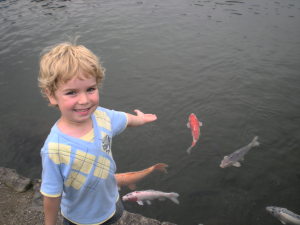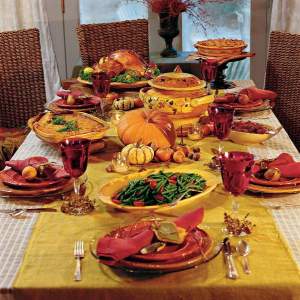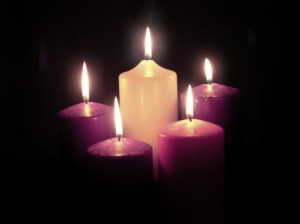It’s the Saturday before Advent begins, and a few of us are at church preparing—setting up the wreath with its purple and pink candles, pulling music from files, and rearranging all of the chairs.
Typically, the Advent wreath is the only visual cue that we’ve entered into a new time, a new space. The chairs haven’t been rearranged in our sanctuary since I started coming to this church a decade ago. Who knows how long they had been that way, divided into three sections, the rows straight and predictable? From an aesthetic standpoint, our church is simple, straightforward, unfussy. The people provide the color and complexity.
Now our goal is to draw all of those complex people in, arranging the chairs in a way that makes us more concentrated, more connected.
It’s been a difficult year in our fellowship, in individual ways that spill over into the community, and also in corporate ways, as we’ve gone through a leadership transition. As the year comes to an end, I feel the need for us to be close, shoulder-to-shoulder, like a large family squeezing in around the dinner table.
I start by removing about 20 chairs from the back rows. Churches will always have back rows, and people will always gravitate toward them, but our new back rows will be closer to the front. Then I divide the remaining 100 chairs into two groups rather than three, curving them in toward one another in an asymmetrical swoop that reminds me of the shape children create when drawing ears on the sides of a circular face.
My helper is Josiah, a teenage boy I’ve been close to since he and my youngest daughter were both in kindergarten. It takes us a while to get the new arrangement right. How close can we gather the chairs in without being too close? We consider wheelchairs and walkers used by members of our community, infant car seats and older babies who often play at their parents’ feet during worship. We congratulate ourselves as the new arrangement masks some coffee stains on the carpet, only to discover that different stains, once hidden, have been revealed.
Finally, we “test drive” various chairs we’ve set up, from each vantage point looking at where the musicians’ microphones and stands are, where the Advent candles will be lit, where song lyrics and Bible passages will be projected. At one point, Josiah and I are sitting on opposite ends of the swoop of chairs. We can see each other without turning our heads. We smile and exchange an air high-five across the empty worship space.
* * * * *
In America, our love for buffers is clear. Just watch as people choose where to sit in any cafe, movie theater, train or bus. Our tendency is to leave one or two open seats between us and “them.” Are we simply respecting the personal space of others or protecting a selfish need for our own? Or do we go through life with an underlying aversion or suspicion of anyone we don’t know?
I suspect most of us aren’t reasoning out complex justifications for where we sit. These buffers have become largely a matter of habit, both personal and social: This is how we do things. This is what people expect. This is why our ancestors came to America in the first place—for space.
But in church?
Even in churches, we are prone to sidling into a row of chairs, smiling kindly at people sitting in the same row, but leaving a seat or two empty between us. Have our world-weary habits seeped into a place that should by definition be counter-cultural? Have we forgotten what this particular gathering is about?
In this place of worship, after all, we have come together to be together. Yes, we have come to worship God, but we could do that alone—at home or walking city streets or sitting in a park. If we are at church, we are there to be together: To step out of the cold. To gather in a way that creates a margin between the despair we hear on the news and the glimmers of hope we have deep within. To recall moments of balance, of a rightness we’ve caught fleeting glimpses of once or twice in our lives. They are just glimpses, but they’re enough to make us long for more.
* * * * *
On the first Sunday of Advent, we don’t particularly look like a group of expectant people. We straggle in like usual, looking ragtag and weary, even as we exchange smiles and hugs. Most of us might not even be sure why we’re here, but we are here. There is something in this mysterious mix of ingredients we are wondering about or hoping for.
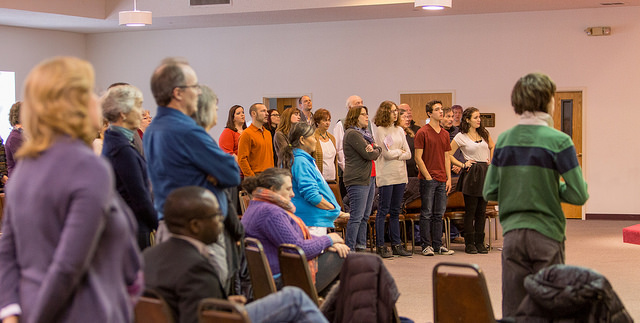 In the worship space, the newly arranged chairs are generating some hubbub, waking people up as their minds scramble to translate old habits into a new arrangement. I hear extra murmuring and some uneasy jokes, meant to cover the confusion; a blend of nerves and excitement fills the space.
In the worship space, the newly arranged chairs are generating some hubbub, waking people up as their minds scramble to translate old habits into a new arrangement. I hear extra murmuring and some uneasy jokes, meant to cover the confusion; a blend of nerves and excitement fills the space.
As people find places to sit, I watch them scoot in to make room, looking down the curve of newly formed rows to see who might be nearby. It is a small change in the scope of things, but we are seeing things differently. We are disoriented, which is often necessary if any reorienting is to happen.
This is, after all, Advent.
* * * * *
The worship space photo in the post is used with permission (and thanks!) to SupernovaPhotography.com.




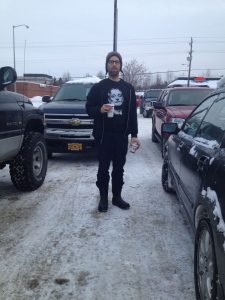
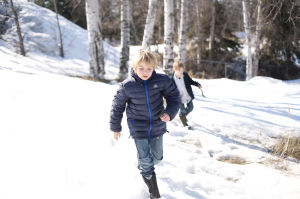
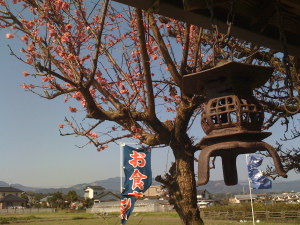
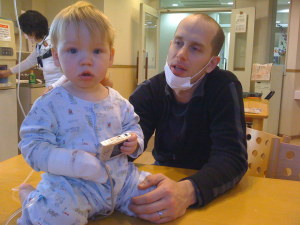
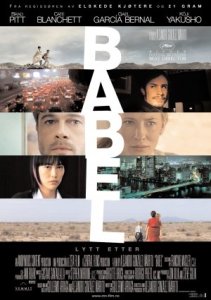
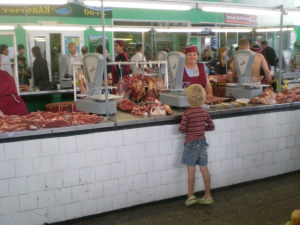 I’ve drifted through a Russian village meat market and stood slack-jawed watching a toothless man butchering a pig – cigarette dangling from his mouth, no shirt or gloves – in a way that would no doubt cause reps from both OSHA and the FDA to collapse from aneurysms. I’ve lived five miles deep in the woods of New Hampshire without running water all winter. Stood thigh-high in steaming piles of horse manure twenty-one miles up a mountain in Oregon, holding only a shovel and longing for nothing more than to finish the job and return to my wood-heated cabin and books a stone’s throw away.
I’ve drifted through a Russian village meat market and stood slack-jawed watching a toothless man butchering a pig – cigarette dangling from his mouth, no shirt or gloves – in a way that would no doubt cause reps from both OSHA and the FDA to collapse from aneurysms. I’ve lived five miles deep in the woods of New Hampshire without running water all winter. Stood thigh-high in steaming piles of horse manure twenty-one miles up a mountain in Oregon, holding only a shovel and longing for nothing more than to finish the job and return to my wood-heated cabin and books a stone’s throw away.